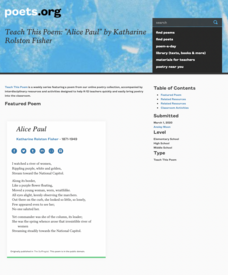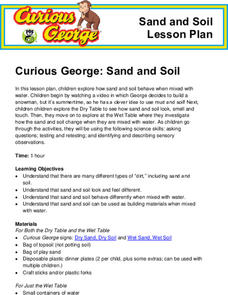Overcoming Obstacles
Cooperation
Young scholars practice cooperation by working together for a common cause. After a short demonstration, learners fill in a T-Chart describing how cooperation looks and sounds. Small groups work together to pick up tiny beads and put...
Overcoming Obstacles
Kindness
Encourage kindness with a lesson that defines kindness, asks scholars how to show kindness, and share how others have shown them kindness. Multiple activities prove that kindness is easy to give through coloring, storytelling,...
Overcoming Obstacles
Self-Control
A lesson plan uses a stop light to assist young scholars in using self-control. After the class defines self-control and how it boosts responsibility and independence, they practice a breathing exercise to reflect on their...
Overcoming Obstacles
Coping Skills
A lesson brings awareness to a variety of emotions. After discussing the many types of emotions, scholars create a list sorting emotions as easy and hard and then brainstorm coping skills. Pupils draw a picture depicting a scenario that...
Overcoming Obstacles
Fairness
Fairness is the subject of a lesson designed to boost relationship skills and social awareness. Class members discuss that fairness is getting what you need when needed, differences are okay, and review classroom rules to...
Overcoming Obstacles
Listening
Young scholars boost communication skills with a lesson that explores what it looks like to listen with the whole body. Through modeling and practice, pupils observe what it looks like and then practice. A friendly game of "Simon...
Wadsworth Atheneum Museum of Art
Can Girls Do That?
Why be limited by stereotypes? Young scholars examine a series of works of art, list the different ways boys and girls are represented, and then discuss the common stereotypes found in the works. They then search for art that does not...
Academy of American Poets
Teach This Poem: "When Fannie Lou Hamer Said" by Mahogany L. Browne
After watching an excerpt from a video of Fannie Lou Hamer's testimony before Congress, pupils do a close reading of Mahogany L. Browne's poem "When Fannie Lou Hamer Said," annotate words and phrases that draw their attention and list...
Academy of American Poets
Teach This Poem: "Alice Paul" by Katharine Rolston Fisher
Powerful women need not look like Wonder Woman. After writing a paragraph about a strong woman they know, young scholars examine images of Alice Paul and then do a close reading of Katharine Rolston Fisher's poem "Alice Paul." Finally,...
Environmental Protection Agency (EPA)
Excuse Me, Is This the Way to the Drainpipe?
Elementary kids read and color the story of Willy Wetsworth, a drop of water, as he describes the journey that he and his friends take to provide fresh water to houses. He tells his story to Martha Merriweather, a little girl, and...
NASA
Heavy Lifting
Accept NASA's challenge to design heavy lifting vehicles. Groups of three design balloon-powered rockets to carry as much payload to the ceiling as possible. The teams are encouraged to launch several times while making...
NASA
3...2...1...Puff!
Which will make it fly better? Individuals build paper rockets with fins that are launched using straws. After determining an average flight distance, they make adjustments, such as size and location of fins, and try again. A second...
NASA
Rocket Races
And they are off! Using Styrofoam meat trays and balloons, individuals build racers that demonstrate Newton's Third Law of Motion. Pupils run their racers three times and make improvements between each trial. To conclude the activity,...
NASA
Water Rocket Construction
What are the basics for building a rocket out of a two-liter bottle? The procedures outline the basics to create an air- and water-powered bottle rocket. Prior to launching the rockets, teams perform safety checks to ensure their designs...
Nemours KidsHealth
Obesity: Grades K-2
Kids Health presents two lessons that encourage them to move their bodies and eat balanced meals. In making smart choices, learners list five exercise activities to replace screen time. Pupils discuss types of food and categorize them as...
Nemours KidsHealth
Alcohol: Grades K-2
Two lessons focus on alcohol's effects on the human body and encourage participants to make responsible choices. First, scholars identify five adults they can turn to for guidance and craft a construction paper hand that lists the...
Nemours KidsHealth
Fast Break!: Grades K-2
Before a test or quiz, warm up the brain and body with two minutes of exercise. Browse seven cards that showcase a different exercise. Each card provides a picture and a written description.
Nemours KidsHealth
Colds and Flu: Grades K-2
Two lessons identify three steps to prevent catching a common cold or the flu. The first lesson plan turns a familiar song into a friendly reminder to wash hands, cover your coughs, sneezes, and keep hands off your face. Lesson two...
PBS
Curious George: Water Drops
A short video features Curious George playing with pots filled with colored water. Scholars then take to colored water with eye droppers and observation skills. They examine what happens to water drops when dropped from different...
PBS
Curious George: Sand and Soil
Two sensory tables—wet and dry—allow scholars to use their sense of sight, touch, and smell to observe the changes when the dirt mixes with water. A short video relates the STEM learning experience to a fun video clip where Curious...
PBS
Curious George: Graphing
After watching an engaging video where Curious George gets to play librarian for the day, sorting books, scholars sort information and graph their data. Learners move from concrete to picture to abstract graphing and analyze...
PBS
Curious George: Blowing in the Wind
A lesson all about wind begins with a short video featuring the loveable monkey, Curious George. Scholars take part in thoughtful discussion then set forth to identify objects that wind can move. They record their findings on a chart and...
PBS
Curious George: Fan and Blow
What kind of wind works best to make things move? After watching a short video from Curious George, super scientists answer the question by testing various wind-making tools. Learners observe, record, and share their findings.
Nemours KidsHealth
Screen Time: Grades K-2
Two lessons encourage class members to go screen-free. The first lesson challenges two teams to create a list of screen-free games. The team with the most ideas wins. Individuals then draw a picture of themselves doing one of the...























